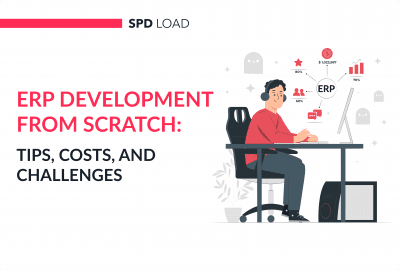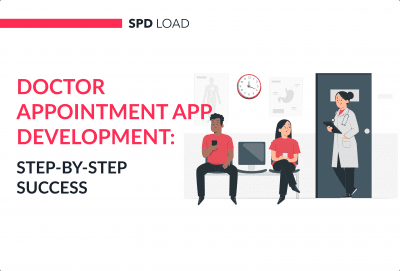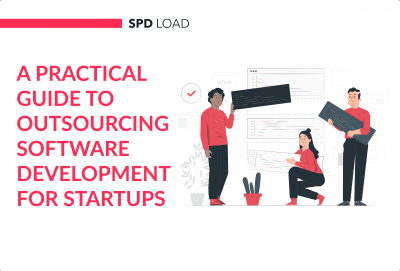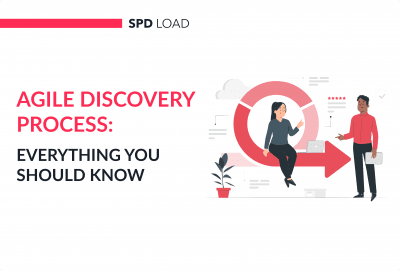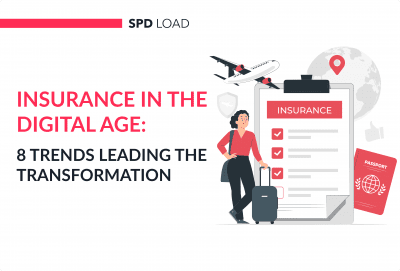The Best HR Software Solutions for Your Business
- Created: Jul 12, 2024
- 26 min
Whether you are running a startup or a big enterprise, having reliable HR software is a must. HR tools were created to simplify HR tasks and enhance overall workforce management.
They automate repetitive tasks, reduce errors, and free up your HR team to focus on strategic initiatives. With the right HR software, you can manage payroll, benefits, recruitment, performance evaluations, and compliance more efficiently.
Choosing the best solution for your business can lead to improved employee satisfaction, better data management, and enhanced productivity.
In this article, we will explore some of the top HR software solutions available to help you make an informed decision.
Here’s a brief outline of what we are going to cover further:
- HR Software market overview
- Benefits of HR software
- Types of HR tools
- Choosing the best software for HR: essential features to consider
- List of top 30 HR solutions, their pros and cons
- 5 steps to selecting the best HR tool for your organization
- How much does HR software costs (+ hidden costs to be aware of)
- HR solutions trends for 2025 and beyond
- Thinking of developing your own HR tool? We can help!
Let’s go!
Drop us a line and we'll get back to you immediately to schedule a call and discuss your needs personally.
HR Software Market Overview
HR software, or Human Resources software, is a digital tool that automates and simplifies HR processes in an organization.
It has many tools and features to manage different aspects of human resources. These include employee data and document management, payroll, benefits admin, recruitment, performance management, time and attendance, compliance with labour laws etc.
HR software can be cloud-based or on premise and often integrates with other business systems to have all HR activities in one place. If you are interested in cloud-based HR software, explore our cloud application development services for more insights.
The HR software market is growing fast.
It was $15.59 billion in 2020 and will be $33.57 billion by 2028.
That’s a growth rate of 10.10% from 2021 to 2028. 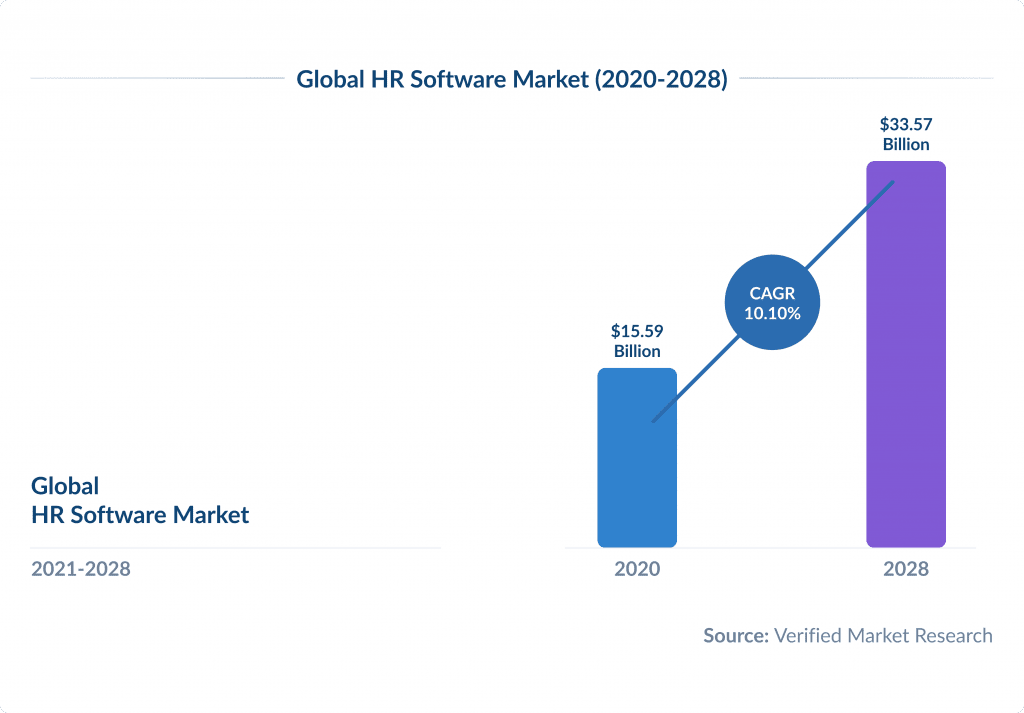
This is mainly because more companies are using mobile and cloud based technologies.
Automation in HR tasks and the popularity of cloud services like Software as a Service are also key factors.
These technologies make updates automatic, document management easier and access from anywhere which makes them very attractive to businesses.
And companies are changing the way they manage their workforce.
More millennials and Gen Zs are entering the workforce and baby boomers are retiring so there is a growing need for HR software to manage this change.
This will further fuel the demand for HR software.
Importance of HR Software in Modern Business
HR software is an essential tool for modern businesses. It provides numerous benefits that enhance efficiency, compliance, and employee satisfaction.
By automating routine tasks, centralizing data, and offering valuable insights, HR software helps businesses manage their human resources more effectively and strategically.
This ultimately contributes to a more productive, compliant, and engaged workforce, driving overall business success.
Let’s explore the benefits of HR software further.
HR Software Benefits
HR software does it all.
From employee data management, payroll, benefits administration, to recruitment, performance management, time and attendance tracking, and labour laws compliance.
For companies looking to streamline hiring, choosing the best recruitment CRM can make all the difference in talent acquisition.
Here are the top HR tools benefits as per HR professionals.
Efficiency and Automation
One of the biggest benefits is efficiency and automation.
Automating administrative tasks like payroll processing, leave management, onboarding and time tracking reduces the workload on HR team and allows them to focus on more strategic activities.
For instance, a study by American Payroll Association found that automation can reduce payroll processing time by up to 80%. This is a big time saving that HR software can give.
Compliance and Risk Management
Compliance and risk management are another big benefits of HR software.
Keeping up with changing labour laws and regulations can be tough. HR software ensures businesses stay compliant by automatically updating policies and procedures to reflect the latest laws.
It also keeps records accurate which is essential for audits and compliance.
As per a survey by Ernst & Young, 59% of businesses cited labour laws compliance as one of the toughest part of HR management, so HR software is a must have.
Reporting and Analytics
Ability to generate insightful reporting and analytics is another big benefit of HR software.
These tools help businesses make data driven decisions by providing reports on various HR metrics such as employee performance, turnover rates and recruitment effectiveness.
Data visualization features help to identify trends and patterns so you can plan and strategize.
A Deloitte survey found that 71% of companies consider people analytics as a high priority, so data driven insights in HR is valued.
Employee Experience
Improving employee experience is a key focus of modern HR software.
Features like self-service portals allow employees to access and update their personal information, view payslips, apply for leave and enroll in benefits programs on their own.
This empowerment increases employee satisfaction and reduces the administrative workload on HR team.
Also, streamlined communication tools help in better communication between employees and management and career development resources help in skill growth and career advancement.
As per Gallup, companies with high employee engagement see 21% more productivity. 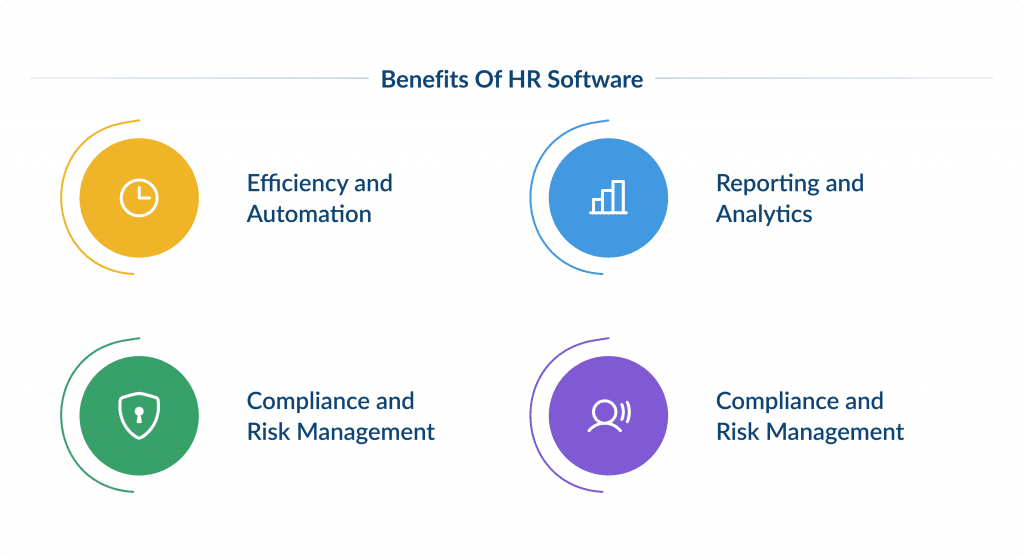
Types of HR Software
There are many types of HR software out there. Some are all-encompassing and cover all HR functions, others are specific to certain areas of HR.
Here’s a rundown of the different types of HR software and what they offer.
Human Resource Information Systems (HRIS)
HRIS is the database where you store and manage employee information.
It’s designed for HR teams and employees to access and update personal and professional details.
Includes:
- Centralised storage of employee details such as personal info, job roles and employment history.
- Automatic calculation of pay, deductions and disbursements.
- Management of employee benefits programs including health insurance and retirement plans.
- Tools for recording work hours, leave requests and attendance patterns.
Examples: Deel, Paycor, Rippling
The main advantage of an HRIS is automation and centralised data management of core HR functions.
Human Resource Management Systems (HRMS)
An HRMS builds HRIS a step further by adding features that cater to a wider audience – managers and executives.
It supports HR staff and employees but also management oversight.
Key features include:
- Tools to manage the whole recruitment process from job posting to candidate selection.
- Systems to set goals, conduct evaluations and track employee progress.
- Employee engagement tools to encourage employee participation, feedback and satisfaction.
With these additional features an HRMS provides a more holistic approach to human resource management and addresses operational and strategic needs.
Examples: BambooHR, ADP Workforce Now, Workday
Human Capital Management (HCM) Software
HCM software is the top tier of HR systems.
It’s designed to support strategic human resource planning and employee records management.
HCM tools include:
- Data to forecast HR trends and inform decision making.
- Tools to align human resources to business goals, including succession planning and talent management.
- Integration with CRM and ERP systems to connect with other business systems across the organization (learn more about ERP software development).
Examples: SAP SuccessFactors, Oracle HCM Cloud, Ultimate Software (UltiPro)
In general HCM systems are for businesses that want to use human resources as a strategic asset and align workforce capabilities with long term organisational goals.
Performance Management Software
Performance management software is to help organizations manage employee performance.
Key features:
- Tools to define, communicate and monitor employee goals.
- Structured process for regular performance appraisals and feedback.
- Resources to create and track individual employee development plans.
Examples: 15Five, Lattice, Betterworks
This software ensures continuous improvement and alignment of individual performance with organizational goals.
Applicant Tracking Systems (ATS)
ATS software makes the recruitment process easier by automating many of the tasks involved in hiring.
Key features:
- Posting to multiple job boards and social media.
- Sorting and categorizing resumes based on your criteria.
- Tools to schedule and manage interviews with candidates.
Examples: Greenhouse, Jobvite, Lever
An applicant tracking system speeds up the recruitment process, reduces time-to-hire and improves candidate experience.
Benefits Administration Software
This type of software makes benefits management easier.
Key features:
- Employees can enroll and manage their benefits online.
- Features to track regulatory requirements and benefits compliance.
- Analytics and reporting on benefits usage and costs.
Examples: Zenefits, Gusto, ADP TotalSource
Benefits administration software manages benefits efficiently and compliantly, overall satisfaction.
Scheduling and Shift Planning Software
For businesses with complex scheduling needs, this software manages employee shifts and schedules.
Features:
- Automated creation and management of employee shift schedules.
- Employees can input their availability and request time off.
- Employees can swap shifts with each other.
Examples: Deputy, When I Work, Humanity, and other HR software.
Scheduling software manages workforce better, less scheduling conflicts.
Online Learning HR Platforms
These platforms offer onboarding, employee training and development through online courses and learning resources.
Features:
- Create, distribute and manage online courses.
- System will track and report on employee learning and completion.
- Quizzes, forums and multimedia content to engage learners.
Examples: Udemy for Business, Coursera for Business, FutureLearn
Online learning helps to upskill the workforce and a culture of learning. 
Essential Features to Consider
Here’s a comprehensive table outlining key features and considerations to look for in HR software:
| Category | Key Features | Description |
|---|---|---|
| Core HR Management | Employee Information Management | Centralized database for storing employee records and personal information. |
| Attendance and Time Tracking | Tools for tracking employee hours, attendance, and leave management. | |
| Payroll Management | Automated payroll processing, tax calculations, and direct deposit features. | |
| Talent Management | Recruitment and Onboarding | Applicant tracking, job posting, candidate management, and streamlined onboarding processes. |
| Performance Management | Tools for setting goals, tracking performance reviews, and providing feedback. | |
| Learning and Development | Training programs, e-learning modules, and skill development tracking. | |
| Employee Engagement | Employee Self-Service | Portals for employees to access their information, submit requests, and manage benefits. |
| Communication Tools | Platforms for internal communication, announcements, and collaboration. | |
| Employee Surveys and Feedback | Tools for conducting surveys and collecting feedback to gauge employee satisfaction and engagement. | |
| Benefits Management | Benefits Administration | Management of employee benefits, including health insurance, retirement plans, and other perks. |
| Compensation Management | Tools for managing salary structures, bonuses, and compensation planning. | |
| Compliance and Security | Compliance Management | Features to ensure adherence to labor laws, tax regulations, and industry standards. |
| Data Security and Privacy | Strong security measures to protect sensitive employee data and ensure compliance with data protection laws. | |
| Analytics and Reporting | Reporting and Analytics | Comprehensive reporting tools and dashboards for HR metrics and data-driven decision-making. |
| Workforce Planning | Tools for analyzing workforce trends, forecasting, and strategic planning. | |
| Integration and Customization | Integration with Other Systems | Ability to integrate with other software systems like payroll, accounting, and ERP systems. |
| Customization Options | Flexibility to customize workflows, forms, and reports to fit the organization’s specific needs. | |
| User Experience | User-Friendly Interface | Intuitive and easy-to-navigate interface for both HR professionals and employees. |
| Mobile Access | Mobile-friendly platform allowing access and functionality on smartphones and tablets. | |
| Support and Training | Customer Support | Availability of customer support through various channels like phone, email, and live chat. |
| Training and Resources | Availability of training sessions, user manuals, and other resources to help users make the most of the software. |
Top HR platforms also provide plenty of help, such as setup wizards, video tutorials, and 24/7 live chat and phone support.
Vendors for larger companies often guide customers through the implementation process, sometimes for an extra fee. They may also offer dedicated project managers, account executives, or support teams.
We’ve gathered 30 top HR solutions to choose from. Let’s explore them all.
Top 30 HR Software Tools
There are hundreds and thousands of HR tools out there. However, finding the one that fits your company best is a challenge.
We’ve gathered together the top 30 Human Resource Management Software solutions that can benefit your organization.
Explore our SaaS services today
When creating this list, we picked the companies that made it to the G2s Best HR Software list for 2025. We also surfed through other reputable software ratings resources, such as Capterra, TrustRadius and Software Advice.
1. Rippling
Rippling is an all-in-one HR and IT platform that helps you manage your workforce. It automates tasks like payroll, benefits and employee onboarding.
The platform also does device management and app provisioning. Rippling aims to simplify complex administrative tasks, save time and reduce errors.
- Pros: Full feature set, user friendly, robust automation.
- Cons: More expensive than some competitors; users mention occasional issues with customer support.
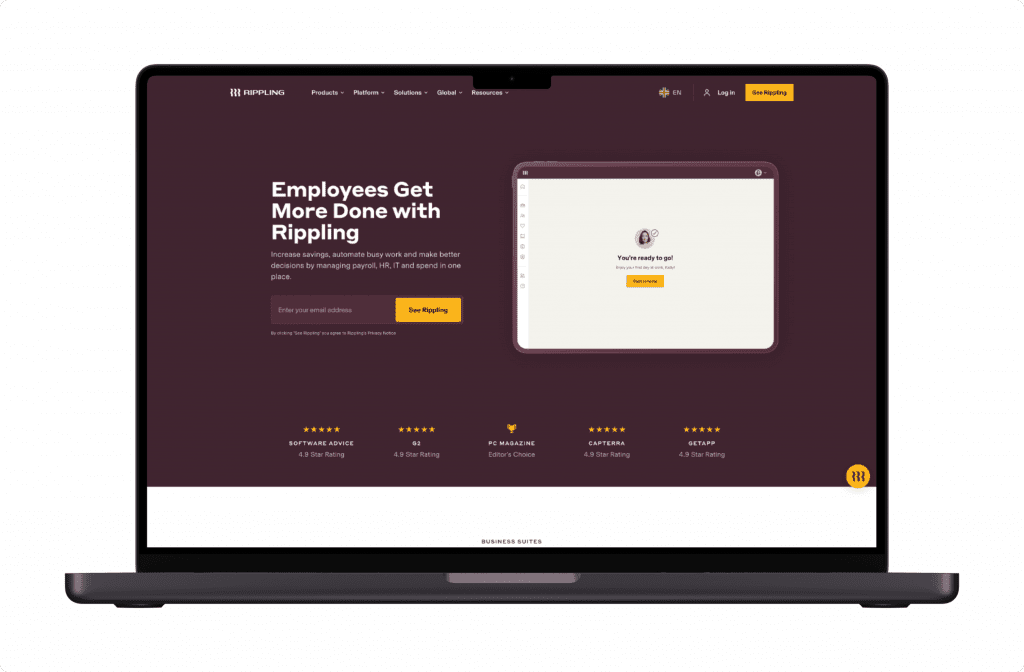
2. Deel
Deel is a global HR solution to hire, manage and pay international employees and contractors.
It simplifies payroll, so you can hire without borders.
The platform handles compliance and payments through its contractor and Employer of Record (EOR) model.
You can create contracts for over 150 countries, offer flexible payment options and 24/7 customer support.
- Pros: Great for global payroll and compliance, easy to use, strong for remote teams.
- Cons: Can be expensive for smaller companies, some features may be too complex for small businesses.
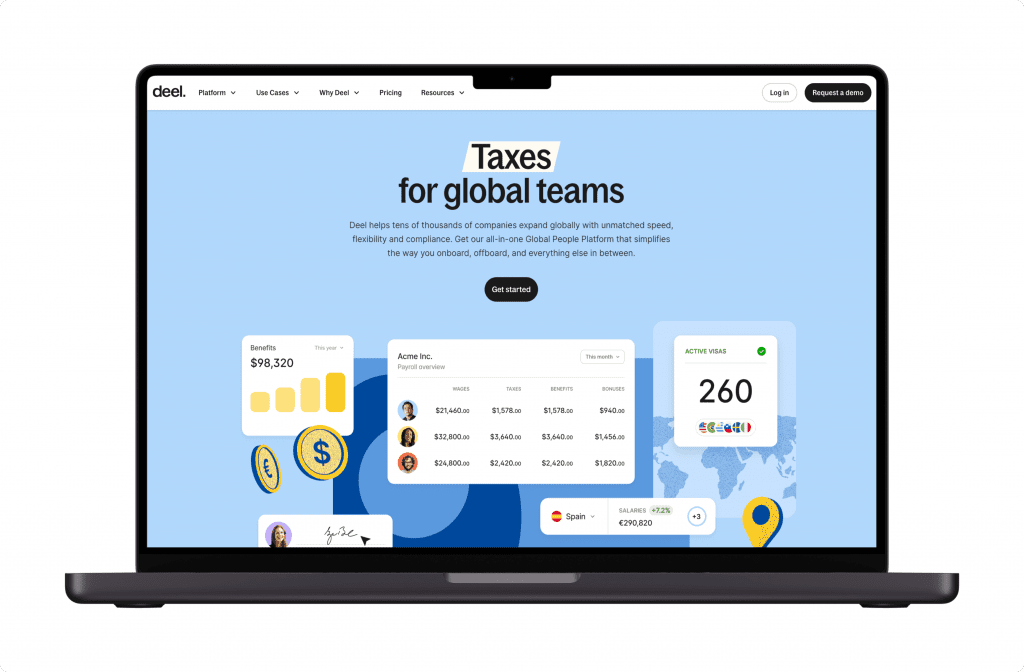
3. isolved
isolved is a comprehensive HR and payroll platform designed for mid-sized businesses
It has payroll, benefits and workforce management solutions.
isolved HCM combines key workforce functions into one easy to use platform. With isolved, now including Mojo, teams can connect and innovate.
The platform manages payroll, HR, time & attendance and benefits all in one application. Mojo has tools to boost engagement, collaboration and performance such as 360 reviews, surveys, goals and idea-sharing feeds.
- Pros: User-friendly, good reporting, and good support.
- Cons: Implementation can take time, some users find the interface old.
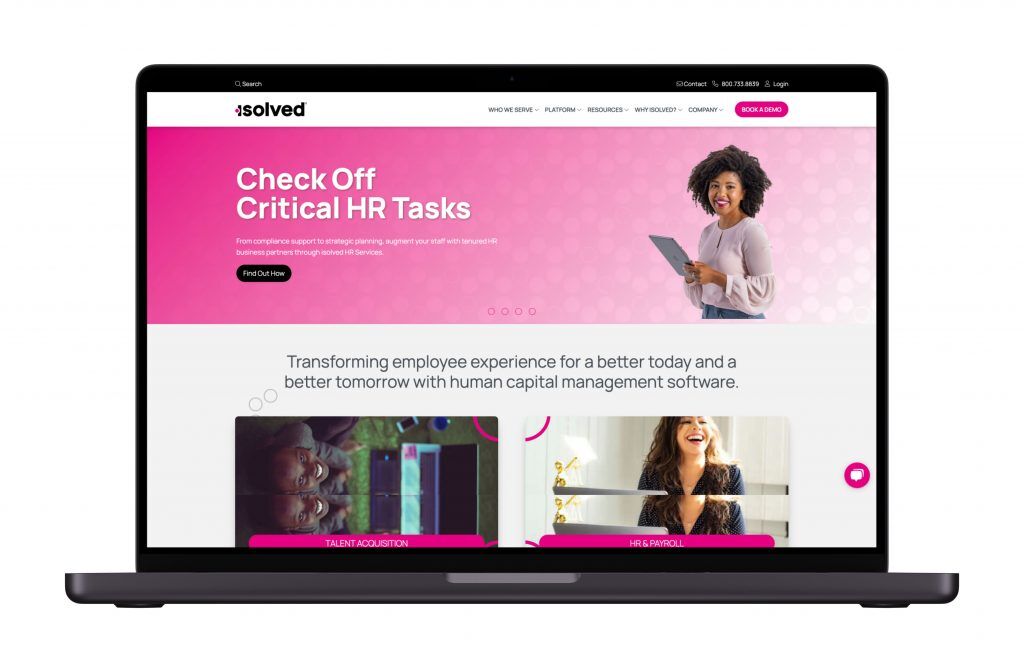
4. Dayforce
Businesses aiming to stay competitive are investing in cloud-based app development for enhanced scalability.
Dayforce by Ceridian is a cloud-based platform that combines HR, payroll, benefits, and talent management into one application.
It helps you move from tracking employee info in spreadsheets to managing it with personalized HR software.
This software saves you time for more important work by streamlining and automating your HR processes. Dayforce makes it easier to manage the workforce.
- Pros: Integrated system, real-time data, strong compliance.
- Cons: Steep learning curve, more expensive for small companies.
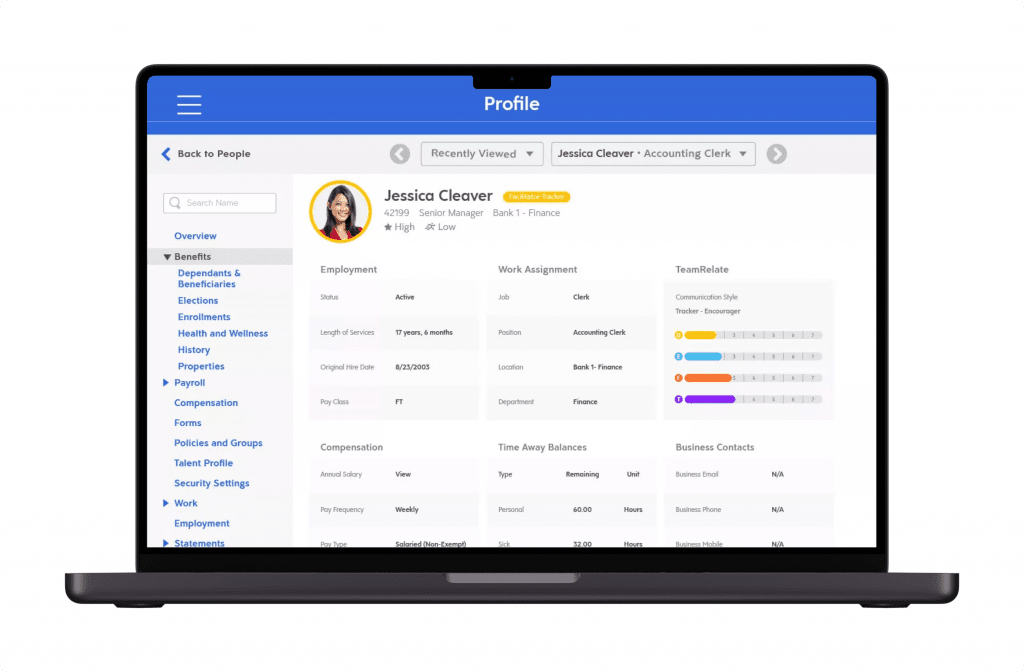
5. BambooHR
BambooHR is an HR software for small to medium-sized businesses that focuses on employee self-service and HR automation.
Paylocity has a full product suite with a single platform for benefits, core HR, payroll, talent, and workforce.
It helps professionals make informed decisions and improve employee engagement in a modern workplace.
- Pros: User-friendly, great support, good for onboarding and performance management.
- Cons: Limited customization, missing some advanced features for larger companies.
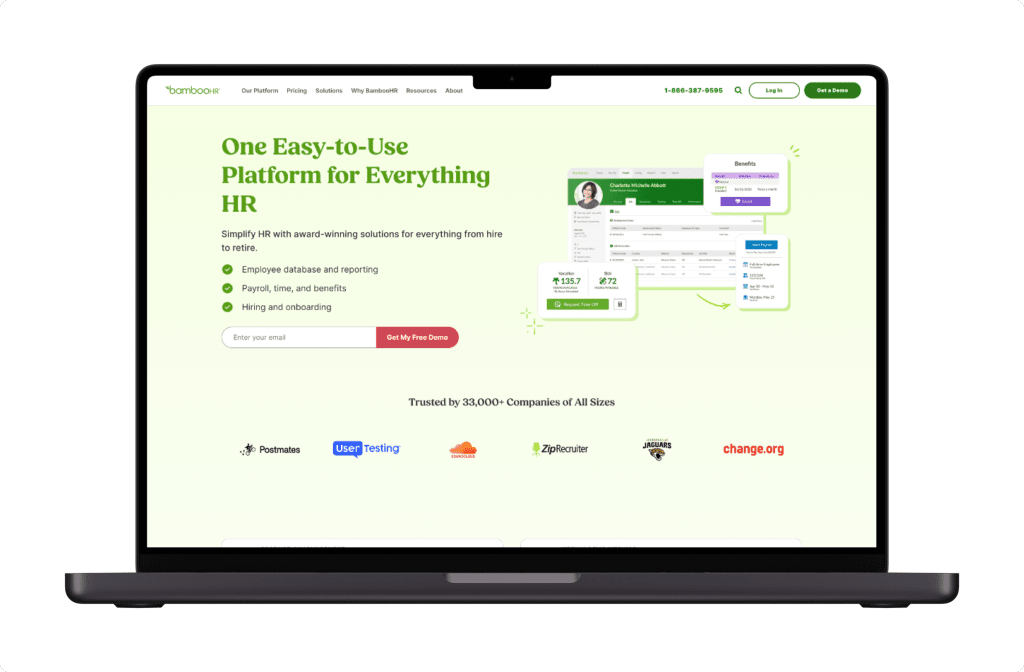
6. Paylocity
Paylocity is a payroll and HR solution for mid-sized businesses.
It has many features to streamline HR processes and employee engagement.
Paylocity simplifies payroll by automating calculations, deductions, and tax filings so you can be accurate and compliant with federal and state regulations.
It has tools to boost employee engagement, such as pulse surveys, recognition programs, and social collaboration platforms to create a positive workplace culture and employee satisfaction.
- Pros: Good reporting, user-friendly mobile app.
- Cons: Support can be spotty; some users have issues with updates.
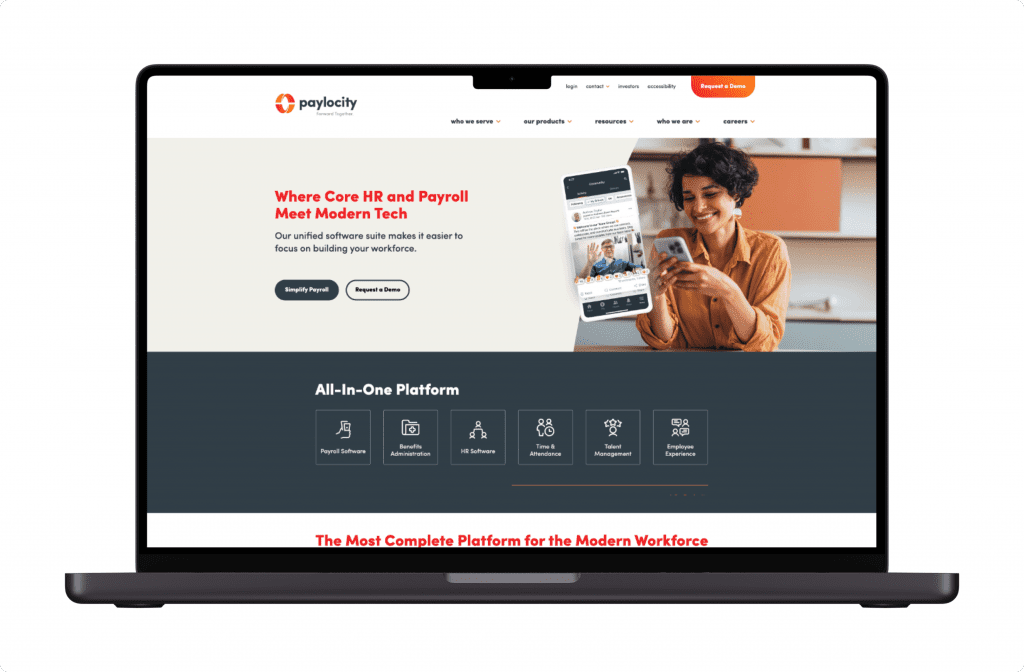
7. ADP Workforce Now
ADP Workforce Now is a simple and powerful solution for companies with 50+ employees. It does basic payroll, ACA compliance, and manages employees across borders to help businesses perform better.
- Pros: Highly scalable, lots of features, good support.
- Cons: Expensive, can be complicated to set up and use.
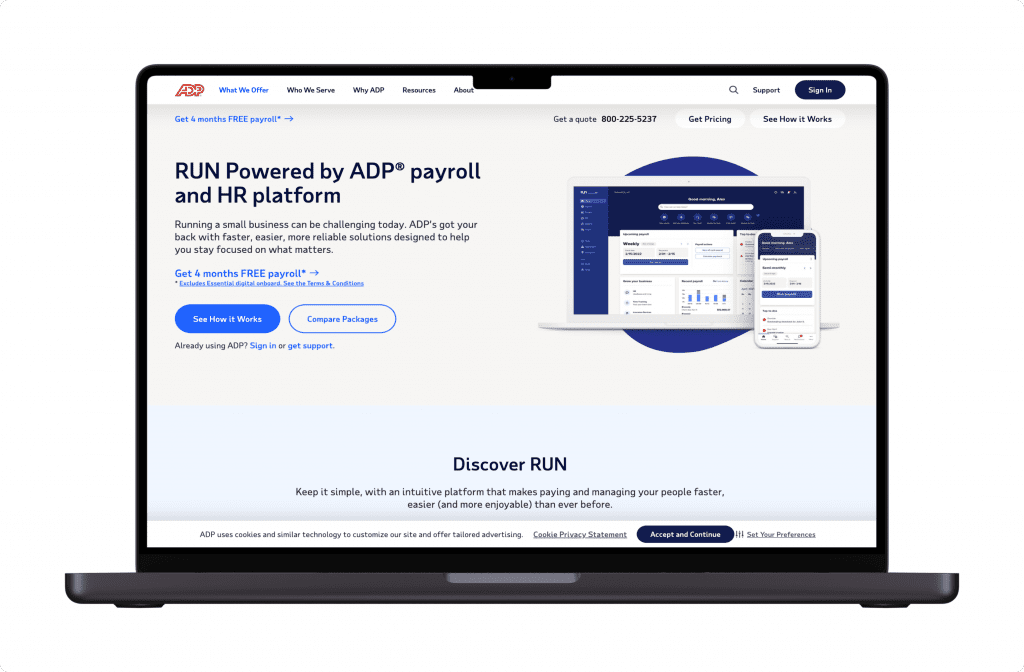
8. HROne
HROne is an HR software platform for businesses in India.
It has solutions for payroll, attendance, recruitment and performance management. The system automates payroll processing so you can pay on time and accurate while complying with Indian labor laws and tax regulations.
- Pros: Affordable, localized support, user friendly.
- Cons: Limited global capabilities, occasional technical issues.
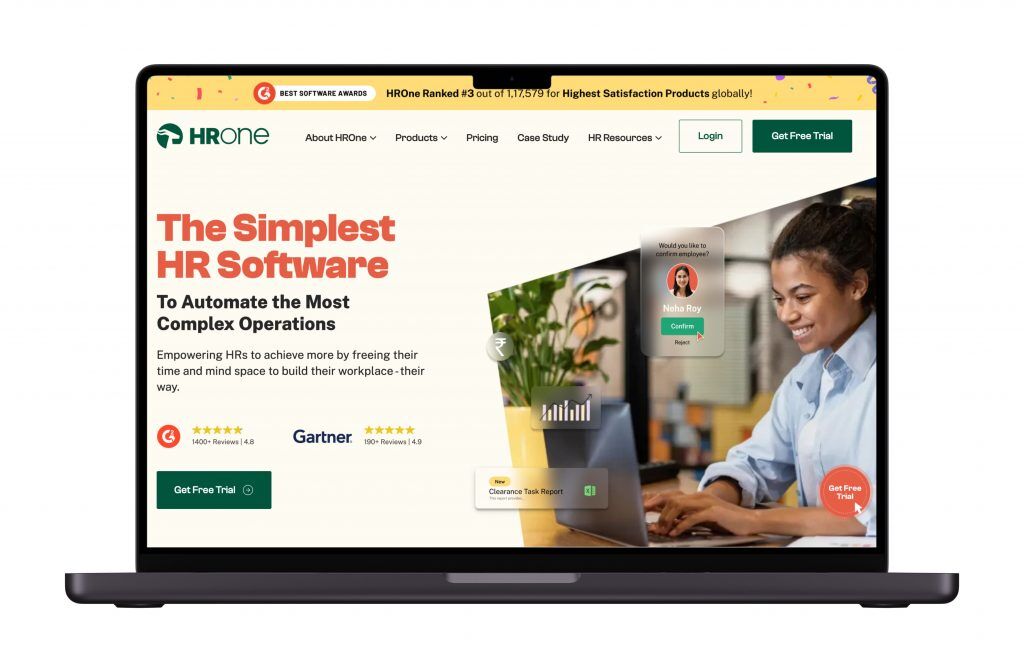
9. Personio
Personio is an HR software solution for small and medium-sized businesses in Europe with a full range of features for core HR, recruitment, and payroll.
The platform automates HR management by automating tasks like employee data management, leave tracking, and document storage so that you comply with European labor laws and GDPR.
- Pros: User friendly, good support, strong focus on the European market.
- Cons: Limited integrations, some advanced features missing.
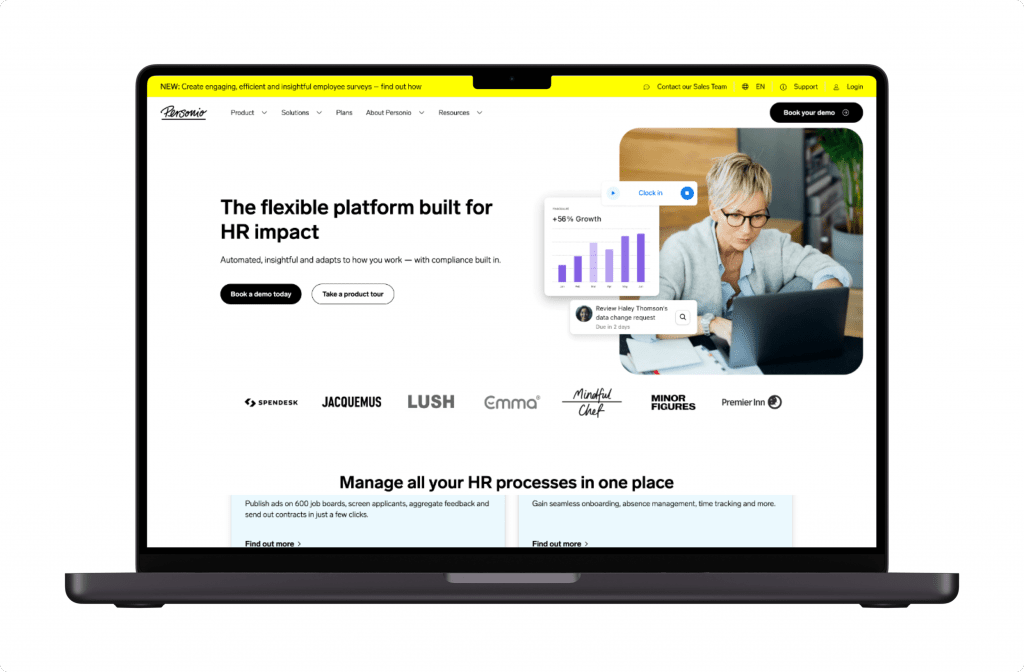
10. Paycom
Paycom is an HR and payroll software that helps you streamline processes from recruitment to retirement.
It has solutions for Talent Acquisition, Time and Labor Management, Payroll, Talent Management and HR Management all in one application. This integration makes HR operations seamless.
- Pros: Full features, user friendly, strong payroll.
- Cons: Expensive, some users find it too complicated.
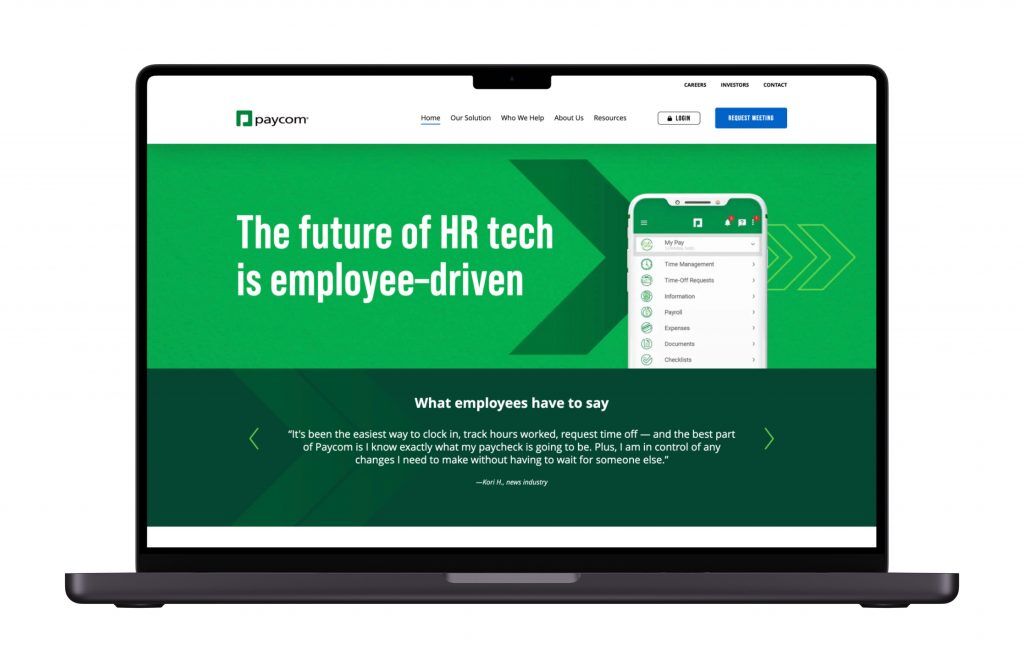
11. HiBob HRIS
HiBob is a modern HRIS platform for fast growing businesses with tools for HR management, employee engagement and analytics.
The platform simplifies business operations so you can manage employee data, benefits and time off. HiBob boosts employee engagement through social collaboration, feedback and recognition programs. It also has powerful analytics to help you understand your workforce.
- Pros: User friendly, good for employee engagement, customizable.
- Cons: Some features still in development, expensive for small businesses.
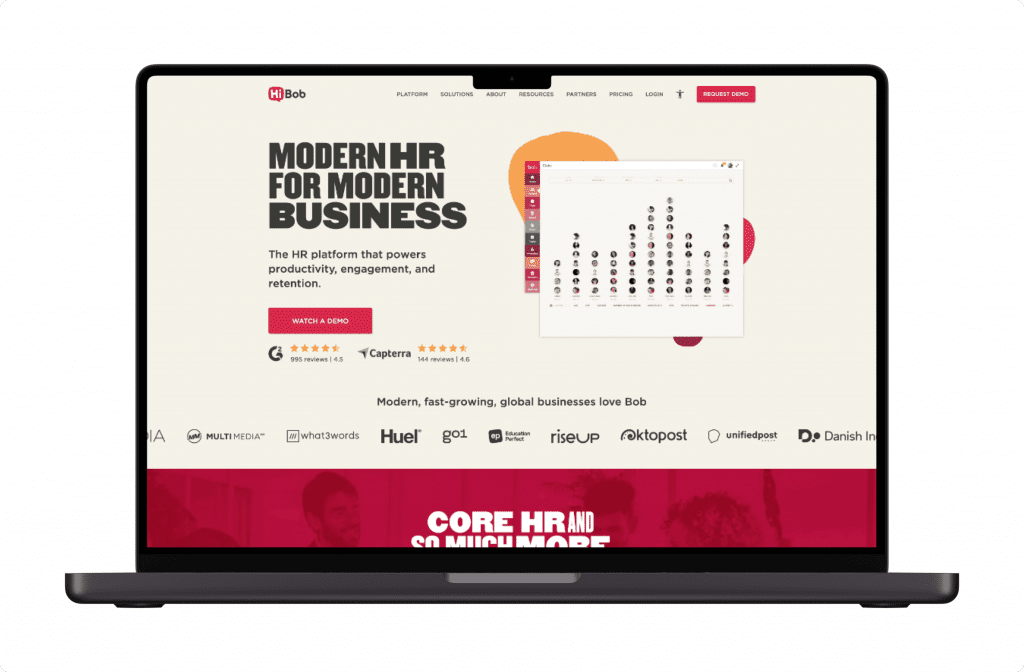
12. Paychex Flex
Paychex Flex is an HR and payroll solution for small- to medium-sized businesses that offer a full range of services.
It simplifies payroll data processing so you can pay on time and accurately.
The platform also handles benefits administration so you can manage employee benefits efficiently. With time and attendance tracking, Paychex Flex simplifies workforce management. And robust reporting and analytics to help you make informed decisions.
- Pros: Scalable, good support, full payroll features.
- Cons: Interface can be confusing, some users have issues with mobile app functionality.
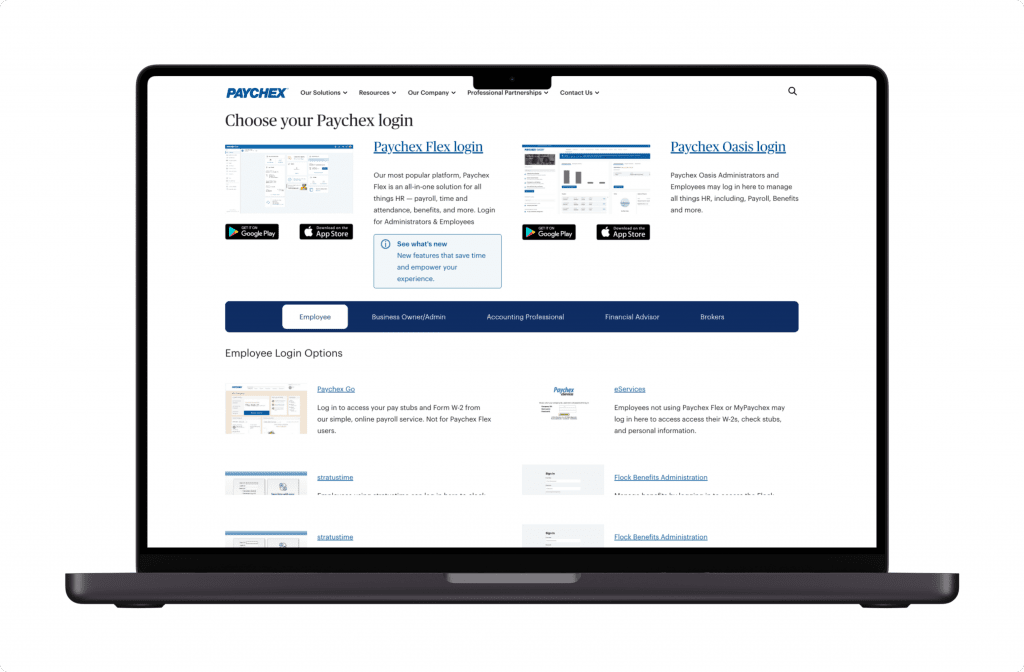
13. Remote
Remote is a platform to simplify global HR management with solutions for hiring, paying, and managing remote employees.
It simplifies the hiring process by handling local compliance, taxes, and benefits. The platform pays remote teams worldwide on time and accurately.
With employee management tools, Remote helps you manage employee data and performance.
- Pros: Great for global payroll and compliance, user-friendly, good support for remote teams.
- Cons: Only for remote teams, expensive for small businesses.
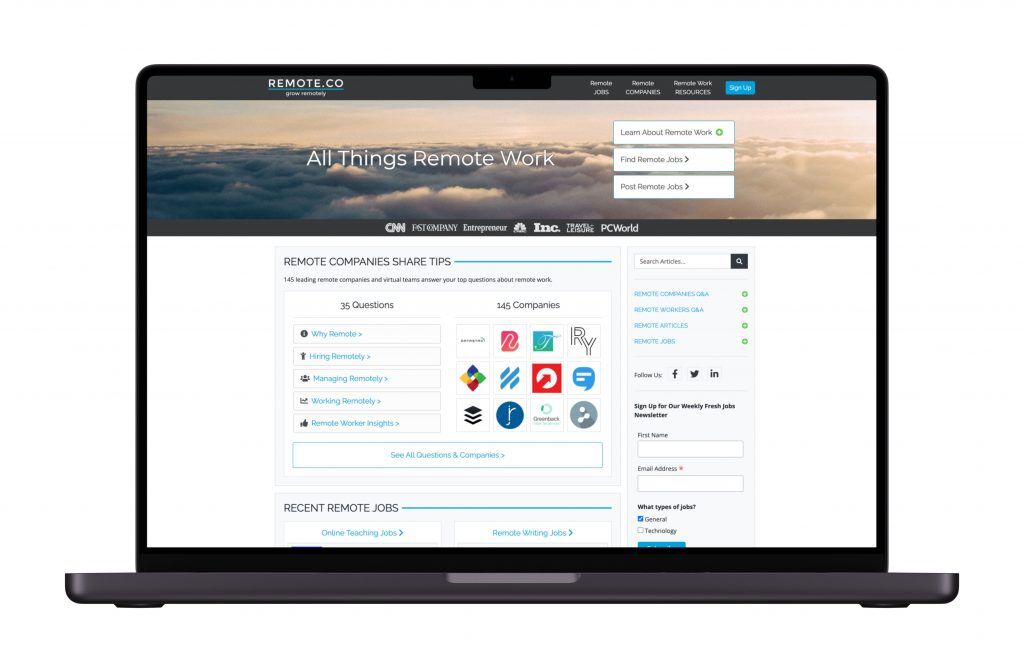
14. RUN Powered by ADP
RUN Powered by ADP is a cloud-based payroll solution for small businesses that provides easy payroll processing and HR management.
A smarter, simpler, and more affordable way to handle payroll, taxes, and HR tasks.
With years of experience and expertise, ADP has created a user-friendly solution so you can focus on what matters most to your business.
- Pros: User friendly, reliable, good support.
- Cons: Limited features compared to other ADP products, expensive for very small businesses.
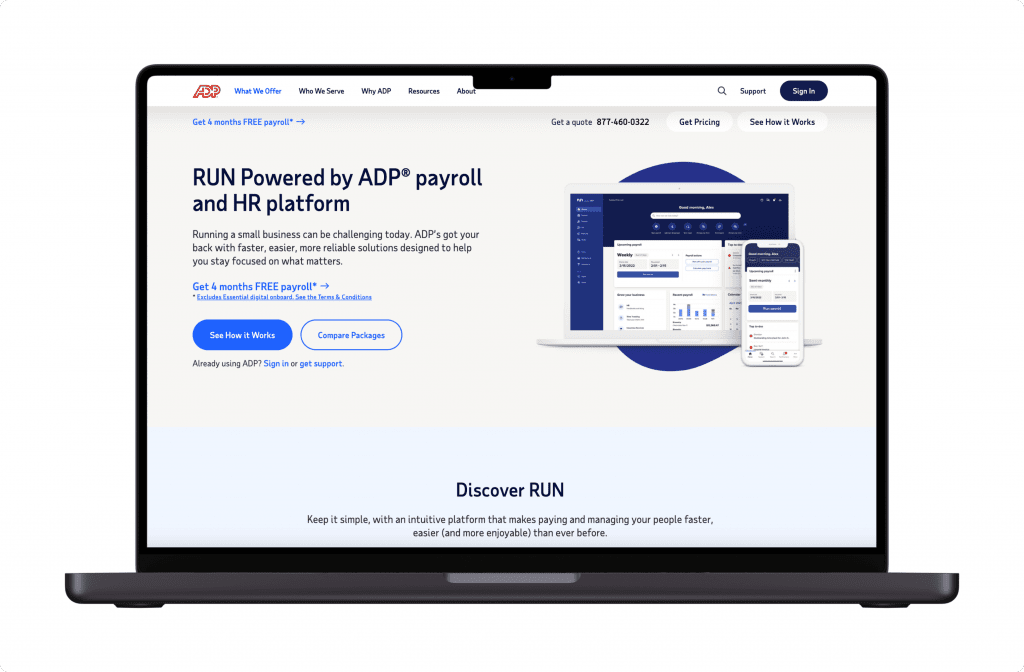
15. SAP SuccessFactors
SAP SuccessFactors is a full cloud-based HR suite with solutions for core HR, talent management, and workforce analytics.
The platform simplifies HR processes from employee data management to benefits administration. It boosts talent management through HR features like recruiting, onboarding and performance reviews. SAP SuccessFactors also has robust workforce analytics to help you make strategic decisions.
User friendly and scalable to manage HR tasks for businesses of all sizes.
- Pros: Highly customizable, scalable, strong analytics.
- Cons: Expensive, complex implementation.
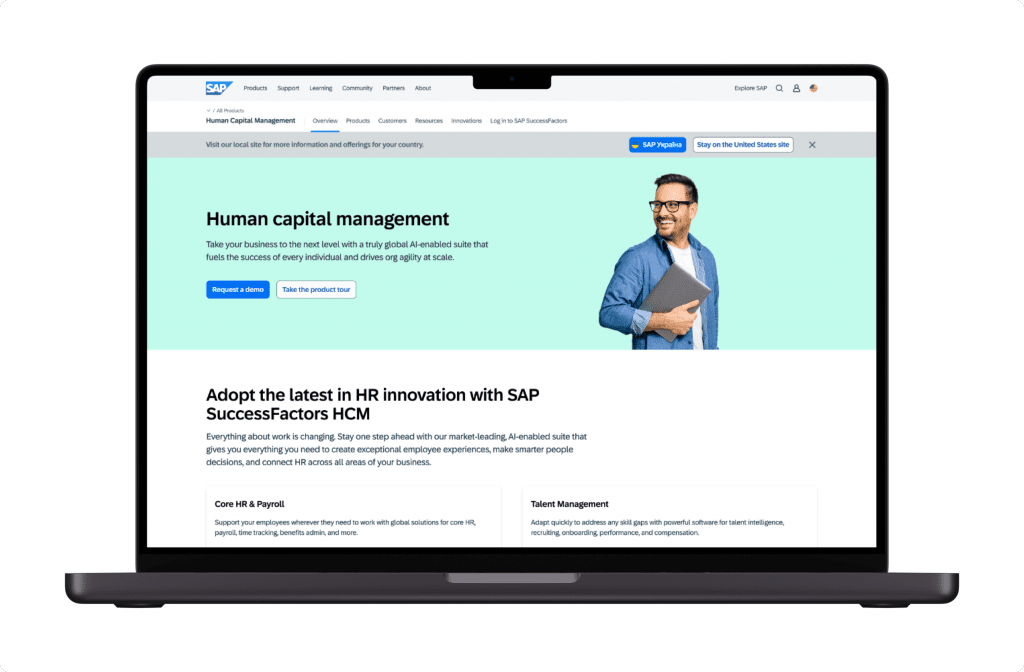
16. Keka
Keka is an HR and payroll software for Indian businesses with solutions for payroll, attendance, performance management and more.
The platform simplifies payroll processing so you can comply with Indian regulations. It has advanced attendance tracking that integrates with biometric devices. Keka also enhances performance management through goal setting, feedback, and reviews.
- Pros: Affordable, user-friendly, good for local compliance.
- Cons: Limited global capabilities. Some users have occasional bug issues.
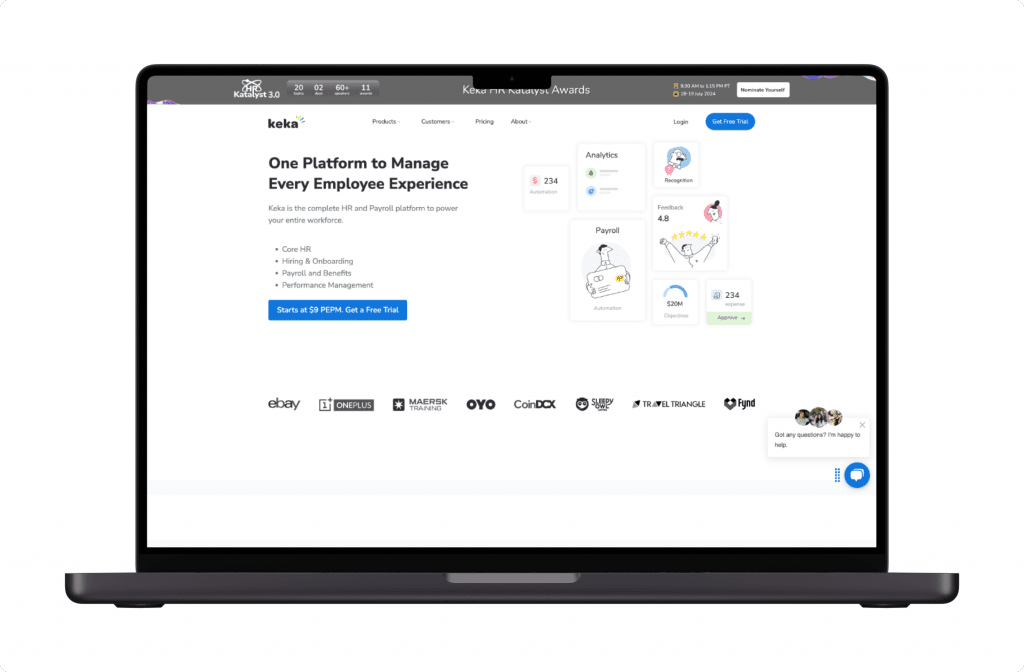
17. Hireology
Hireology is an all-in-one hiring and HR platform that helps businesses simplify recruitment and onboarding.
Since 2010, companies have trusted Hireology to find and hire the people they need. The platform builds brand awareness and markets open roles across multiple channels, including Google, Facebook, job boards, and career sites, to connect with top applicants.
It simplifies and automates hiring processes so you can text and email candidates to engage. Hireology reduces risk with industry specific skills tests, reference checks and background verifications. It accelerates new hire productivity with onboarding and integrations to existing payroll, HRIS and scheduling platforms.
Also, UKG Ready provides insights to hold managers and locations accountable and identify opportunities.
- Pros: Strong recruitment tools, user-friendly, and good support.
- Cons: Limited HR management features beyond hiring can be expensive.
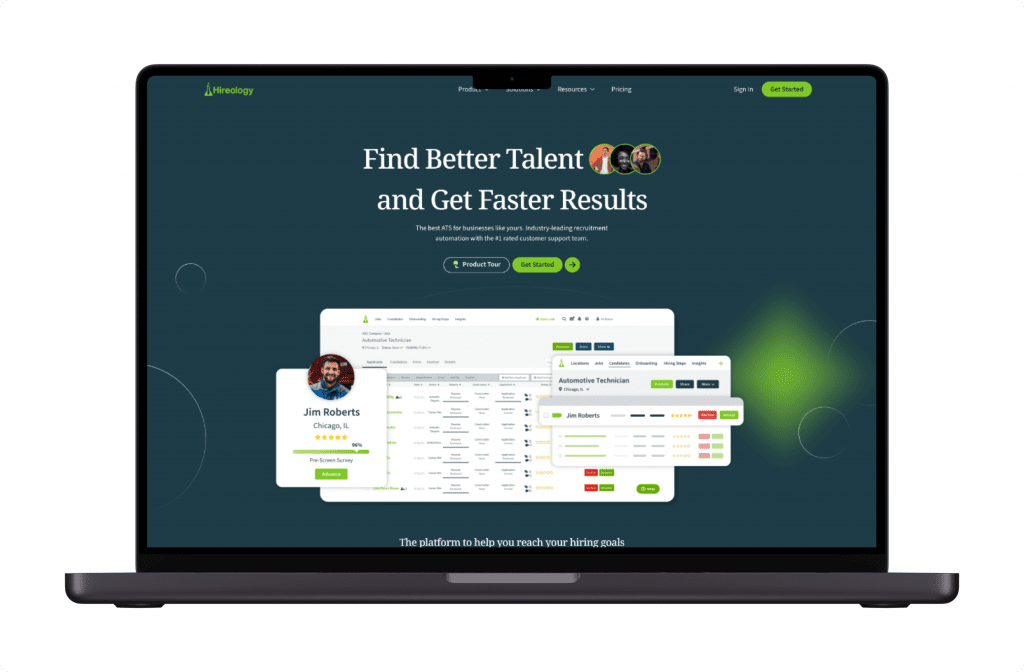
18. UKG Ready
UKG Ready (formerly Kronos Workforce Ready) is a full HR solution that integrates HR, payroll, talent and time management.
For small businesses where everyone wears multiple hats, UKG Ready is an all-in-one HR solution that guides and empowers your HR team to simplify day-to-day tasks. It simplifies HR and payroll processes, making them more efficient and accurate.
It also has talent management and time tracking so it’s a full workforce management solution. With tools, support and time saving features UKG Ready helps businesses focus on growth and making a difference.
- Pros: Integrated platform, good for workforce management, strong analytics.
- Cons: Can be complex to implement and expensive for small businesses.
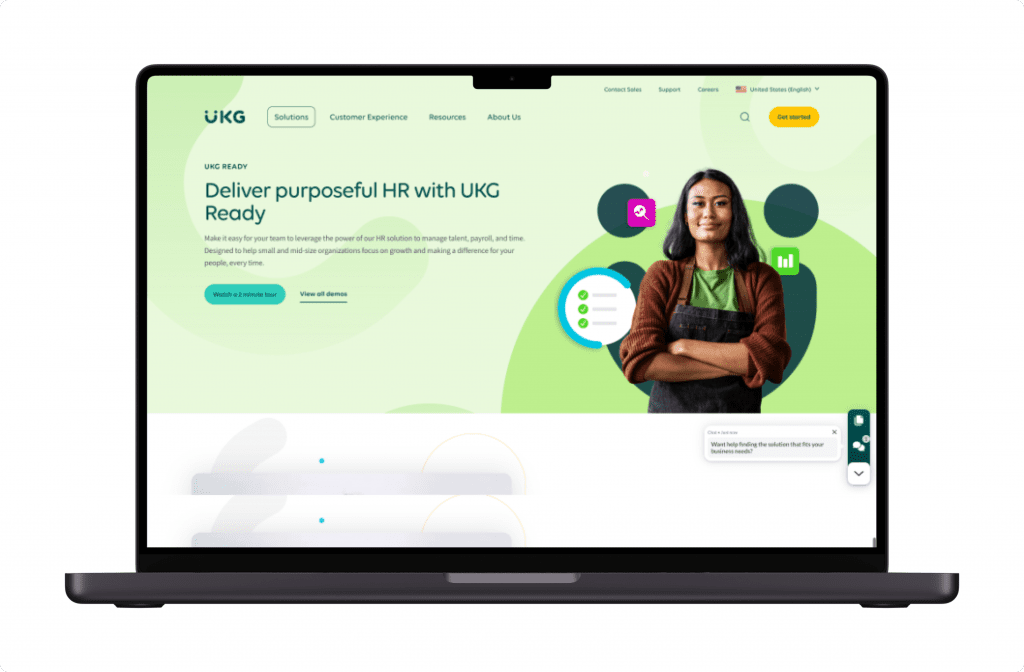
19. Workday HCM
Workday HCM is a cloud based HR platform for large enterprises. It has HR, talent and workforce management solutions.
Built as a single system with a single data source, security model, and user experience, Workday HCM evolves to meet changing business needs.
The user-friendly platform ensures that customers always have the latest features, whether they are accessed via browser or mobile device.
Workday HCM integrates with other Workday products, including Workday Financial Management, Workday Payroll, Workday Recruiting, Workday Learning, and Workday Planning, to provide a comprehensive enterprise solution.
- Pros: Highly scalable, robust features, strong analytics.
- Cons: Very expensive, complex implementation and customization.
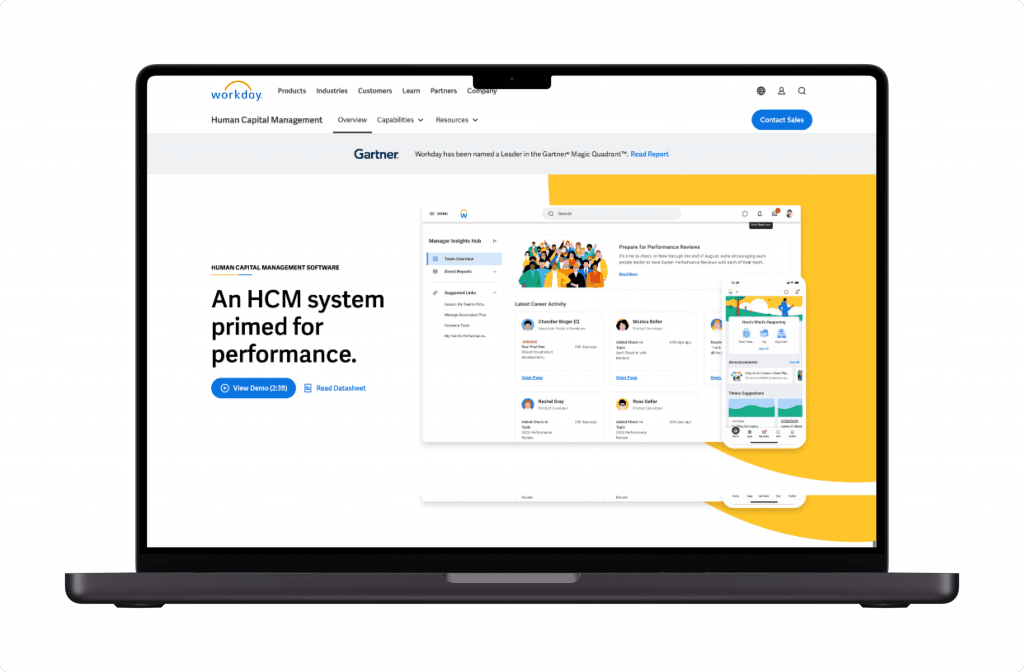
20. G-P (Globalization Partners)
G-P is an HR platform to help companies expand globally, providing solutions for hiring, onboarding, and managing international employees.
The platform unlocks the potential of global teams so companies can build teams anywhere in the world in days not months. With years of experience in global expansion and local labor laws, G-P is the perfect partner for businesses looking to go global.
- Pros: Fast onboarding for international employees, seamless legal, HR, and tax support.
- Cons: May be expensive for small businesses and complex to navigate the many features.
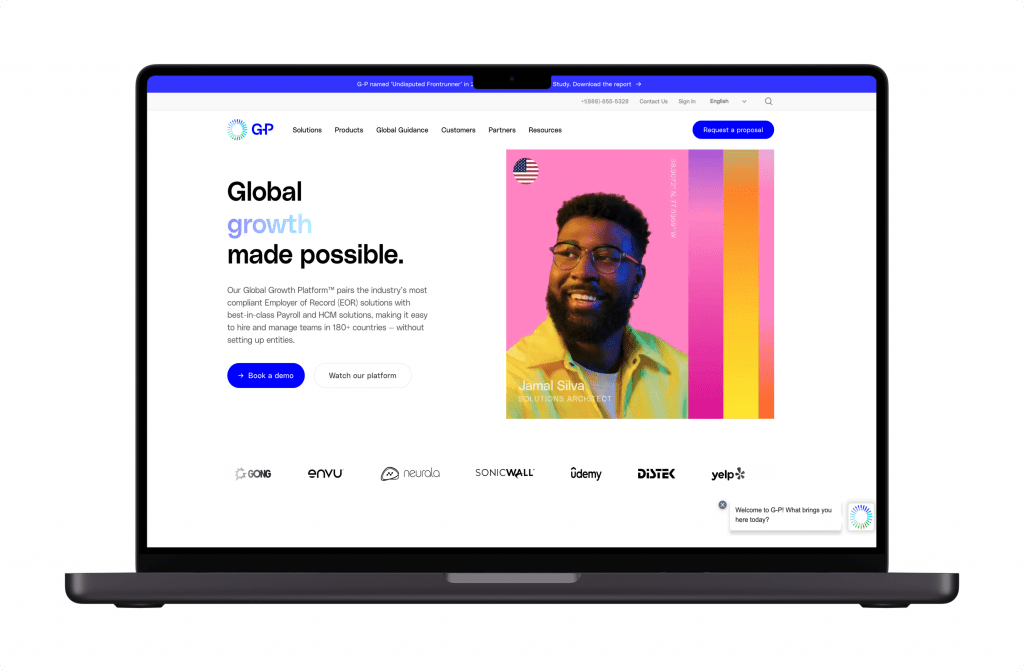
21. Zenefits
Zenefits is a cloud-based HR software that simplifies HR processes, payroll, benefits, and compliance for small to mid-sized businesses.
It has a centralized platform to manage employee data, onboarding, time tracking, and health benefits. Zenefits makes complex HR tasks easy so businesses can manage their workforce efficiently and effectively.
- Pros: User-friendly interface, integration with other systems, comprehensive benefits management.
- Cons: Slow support; some users have issues with payroll.
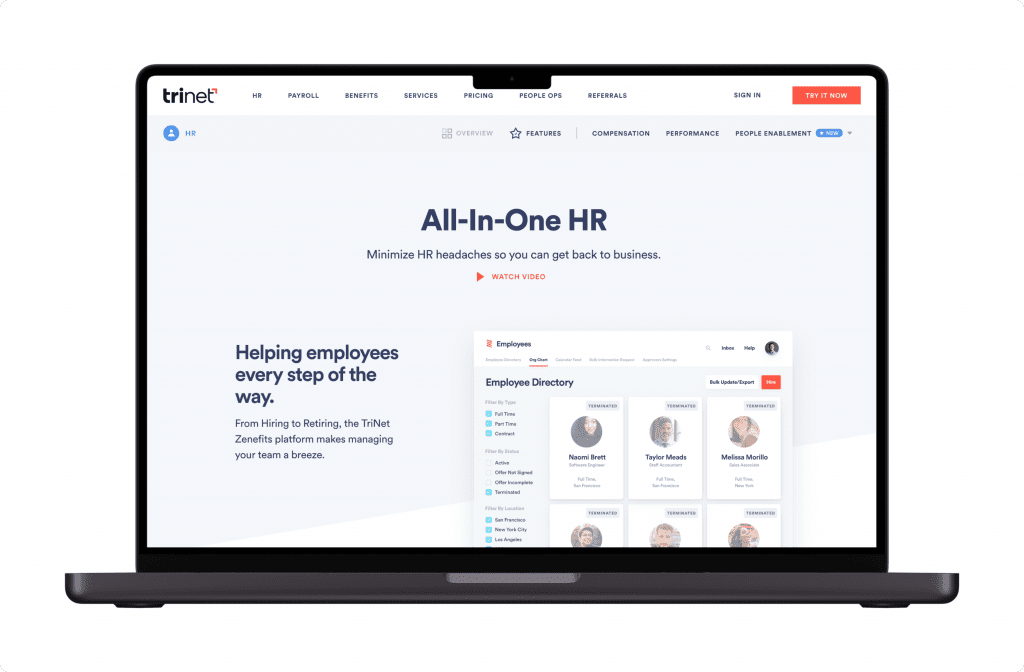
22. Gusto
Gusto is an HR and payroll platform for small businesses.
It has a full suite of HR tools, including payroll, benefits administration, onboarding, and compliance management.
Gusto is known for being simple and easy to use, so it’s a great HR software for small businesses to simplify their HR processes.
The platform centralizes key HR features so you can manage employee data, payroll, benefits, regulatory compliance, and other HR functions.
- Pros: Easy to use, great support, affordable.
- Cons: Limited advanced features, some integrations.
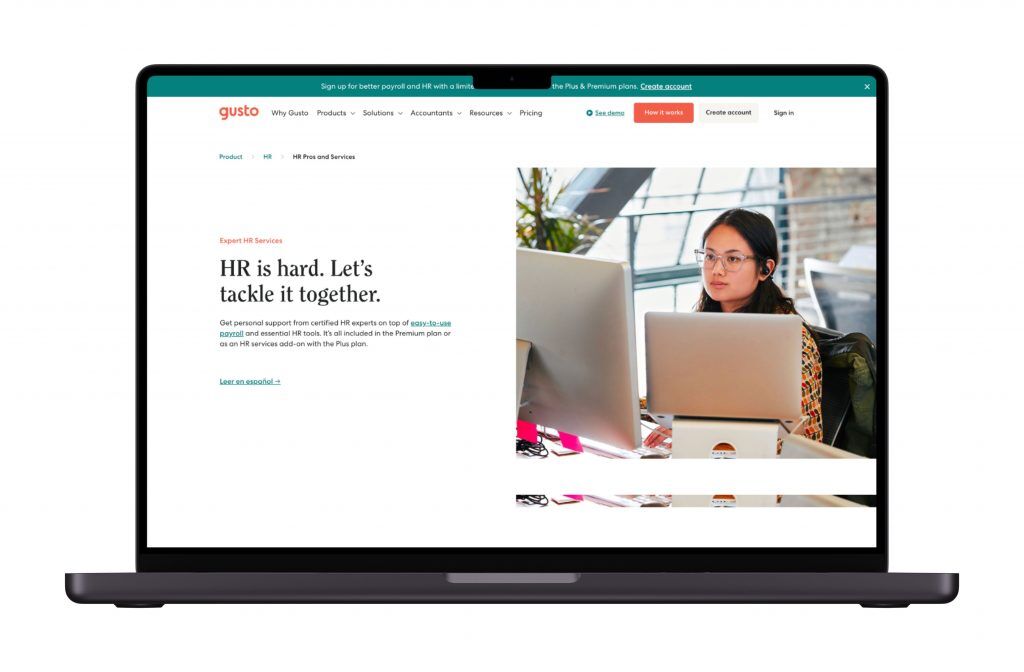
23. Namely
Namely is an HR platform for mid-sized businesses, full suite of HR tools including payroll, talent management, benefits administration and time tracking.
Known for its user friendly design Namely simplifies complex HR tasks and has full functionality. The platform centralises HR management so businesses can manage employee data, performance reviews, benefits and compliance easily.
It’s easy to use and has lots of features, so great for mid-sized businesses to simplify their HR.
- Pros: Easy to use, customizable features, good employee self-service portal.
- Cons: More expensive; some users have issues with support.
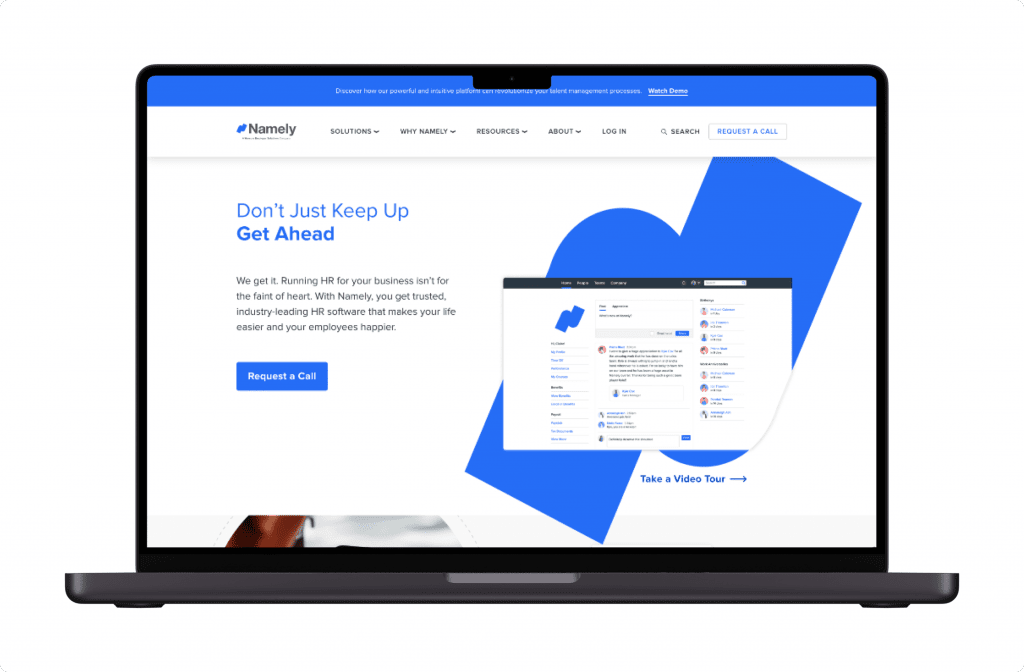
24. TriNet
TriNet is a professional employer organization (PEO) that provides full HR services for small to medium-sized businesses.
It covers payroll, benefits, risk management, and compliance so businesses can outsource their HR functions.
TriNet simplifies employee related tasks so businesses can focus on their core business.
- Pros: Full HR services, expert compliance support, scalable solutions.
- Cons: Expensive; some users find the interface old.
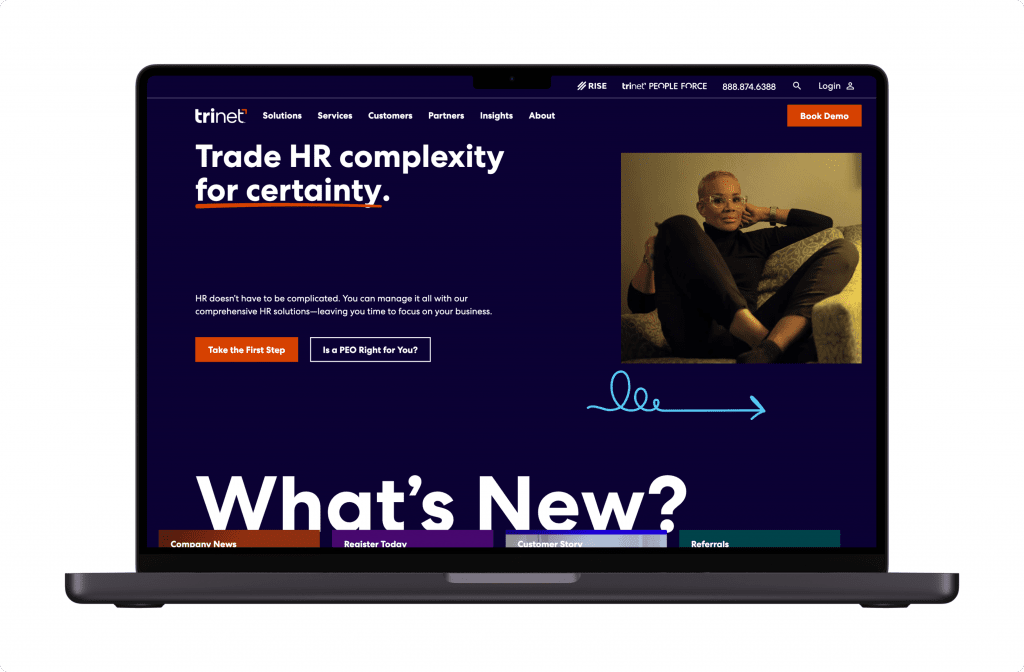
25. Ultimate Software (UltiPro)
UltiPro is a full HR management platform for larger businesses. It has extensive HR, payroll, talent management and time tracking features to improve employee experience and engagement.
UltiPro centralizes HR functions so larger businesses can manage employee data, payroll, talent acquisition, and performance reviews. Its full functionality and user-friendly design make it a must-have for large-scale HR.
- Pros: Full feature set, great reporting, great support.
- Cons: Expensive, complex implementation.
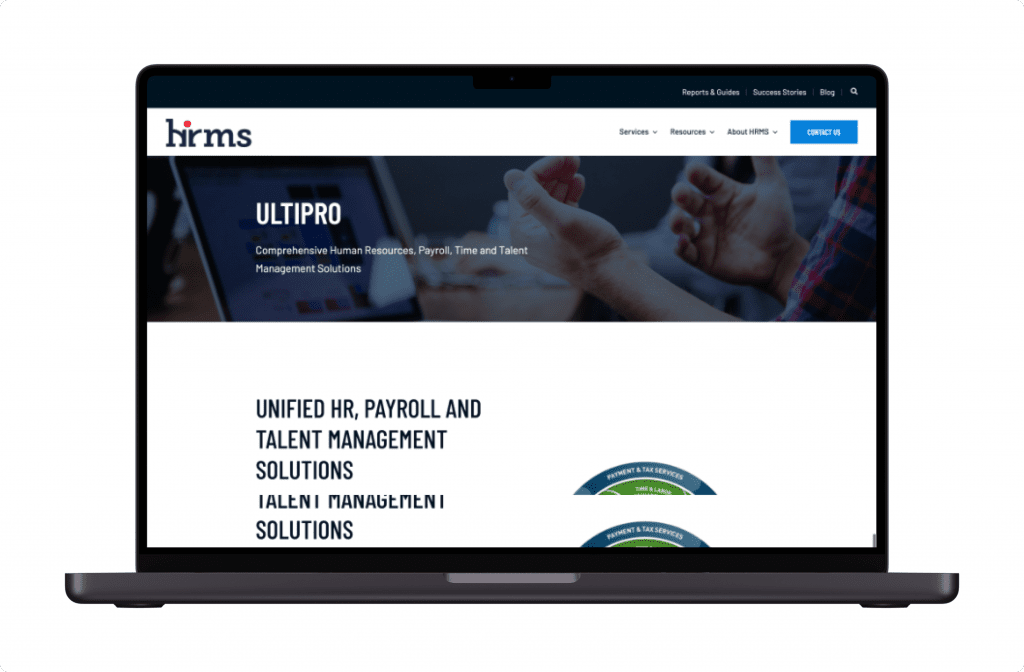
26. ClearCompany
ClearCompany is a talent management software that focuses on recruitment, onboarding, performance management, and workforce planning.
It helps businesses attract, engage, and retain top talent. The platform has full tools to streamline the hiring process, integrate new employees, and manage performance reviews.
- Pros: Strong recruitment and onboarding tools, easy to use, great support.
- Cons: Limited HR management features outside of talent management are expensive.
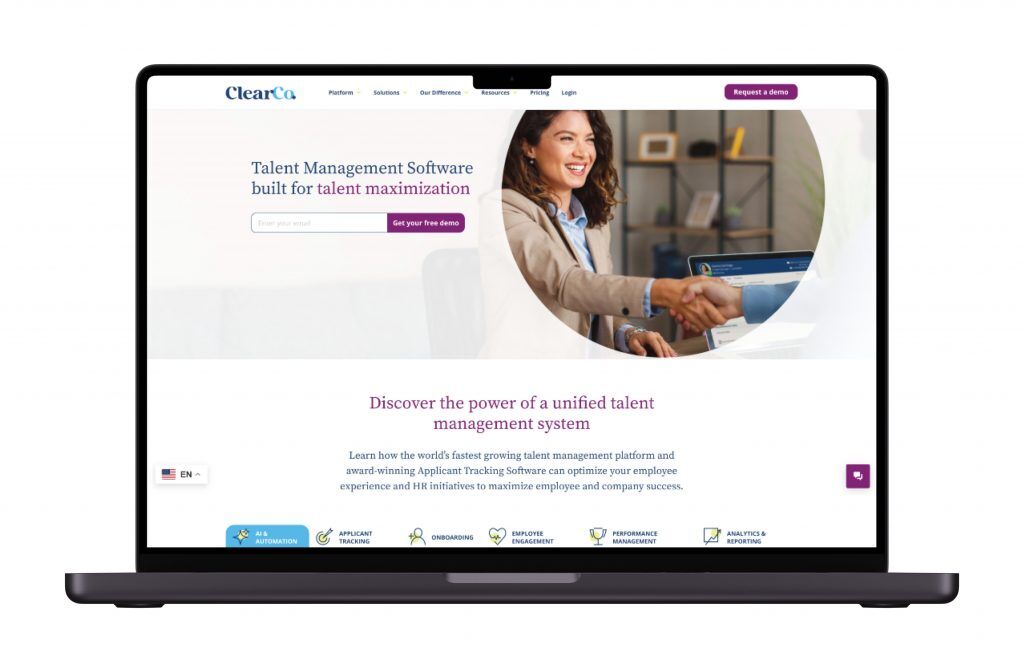
27. Breathe
Breathe is an award winning HR software that helps UK SMEs move their core people processes online. Trusted by over 15,000 UK based small businesses and charities, managing over 400,000 people. Recommended by over 600 partners, Breathe works with organisations like AgeUK, Huel, The Wildlife Trust, Scrub Daddy, Dryrobe, RSPCA.
Breathe has holiday and leave management, sickness and absence monitoring, performance management, expense management, employee scheduling, time tracking, employee database and analytics, unlimited document storage and rota, and time and attendance tracking. It saves time, gives peace of mind and supports businesses no matter where they work.
- Pros: Great for workforce management, robust analytics, scalable.
- Cons: Expensive, complex to implement and use.
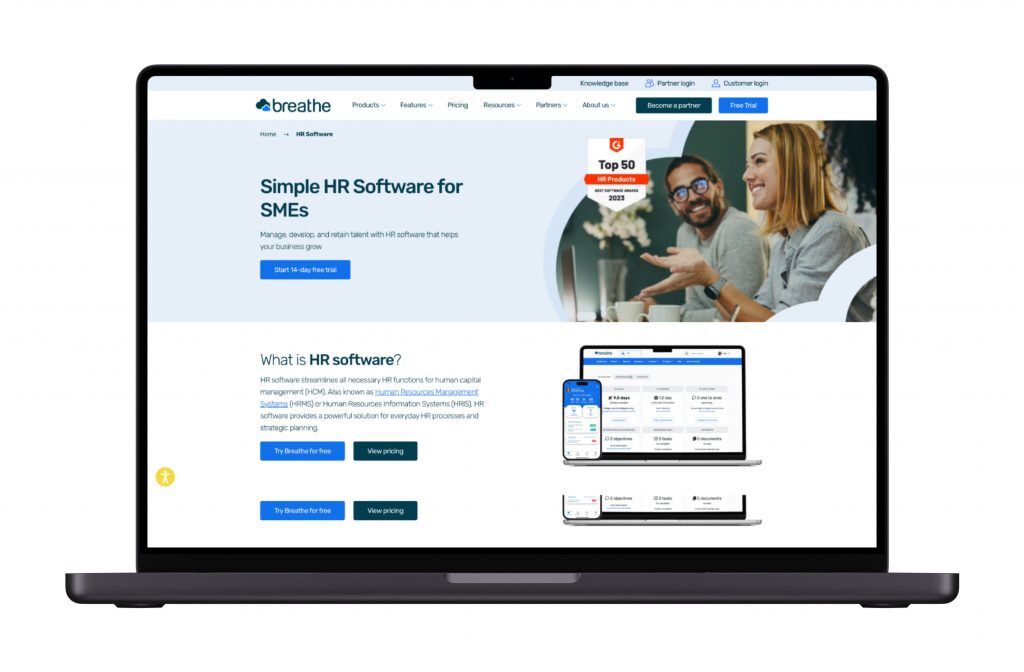
28. Oracle HCM Cloud
Oracle HCM Cloud is a full HR platform for large businesses, a full suite for global HR, talent management, payroll, and workforce management.
What sets Oracle HCM Cloud apart is its focus on data-driven decision-making, with advanced HR analytics that provides critical insights to inform HR strategy. The platform manages complex employee data, smooth and accurate payroll processing, and talent acquisition and development.
- Pros: Highly scalable, full feature set, great analytics.
- Cons: Very expensive, steep learning curve.
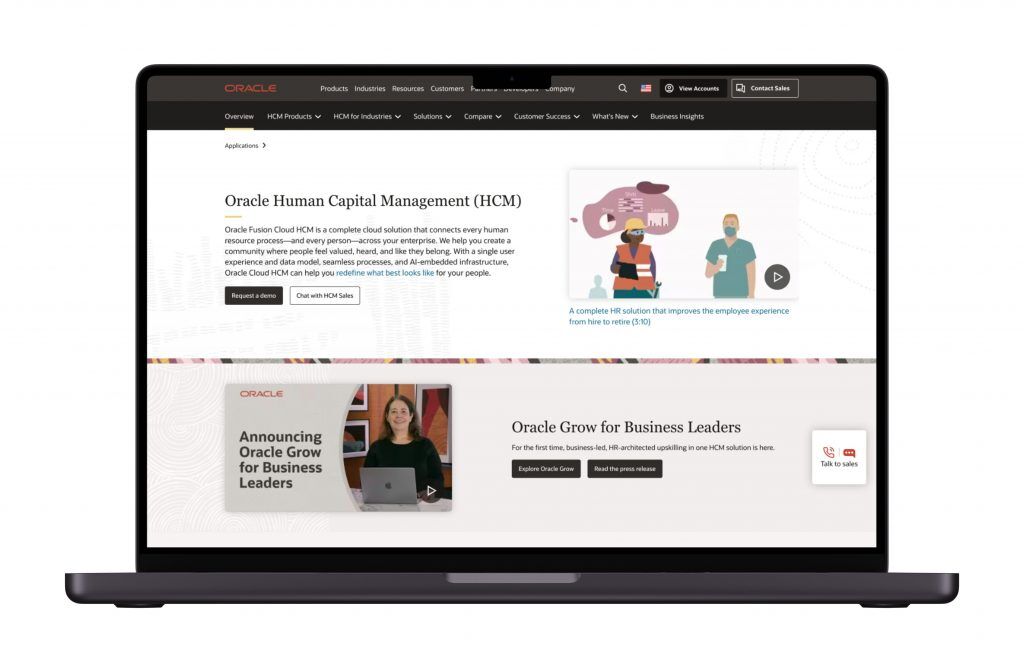
29. Greenhouse
Greenhouse is a full recruitment software that streamlines the entire hiring process for businesses.
Known for being efficient, Greenhouse has robust tools for tracking applicants, managing candidate information, and tracking progress through stages.
The platform schedules interviews and coordinates between candidates and hiring teams. Greenhouse has full features for candidate evaluation so businesses can make informed hiring decisions.
- Pros: Great recruitment features, easy to use, strong integrations.
- Cons: Limited features outside of recruitment, expensive.
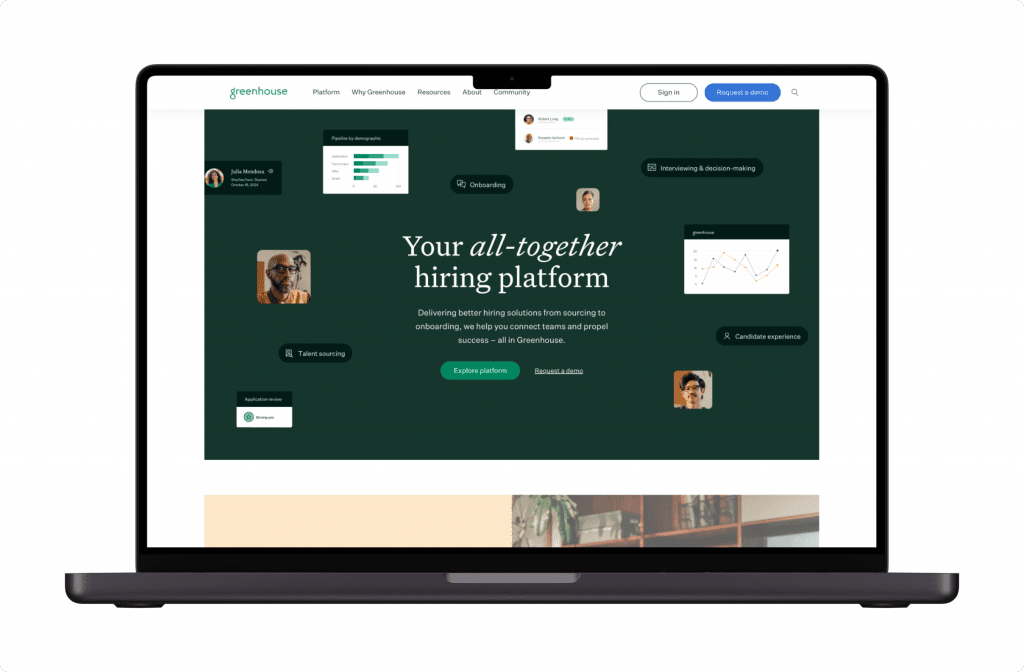
30. Jobvite
Jobvite is a full talent acquisition suite that streamlines recruitment, onboarding, and employee referrals.
It’s designed to increase hiring efficiency and improve candidate experience with its full set of tools. Jobvite simplifies the recruitment process with advanced features for sourcing and tracking candidates.
Onboarding for new hires and employee referral to attract top talent.
- Pros: Great recruitment and referral features, easy to use, good support.
- Cons: More expensive and limited HR features beyond recruitment.
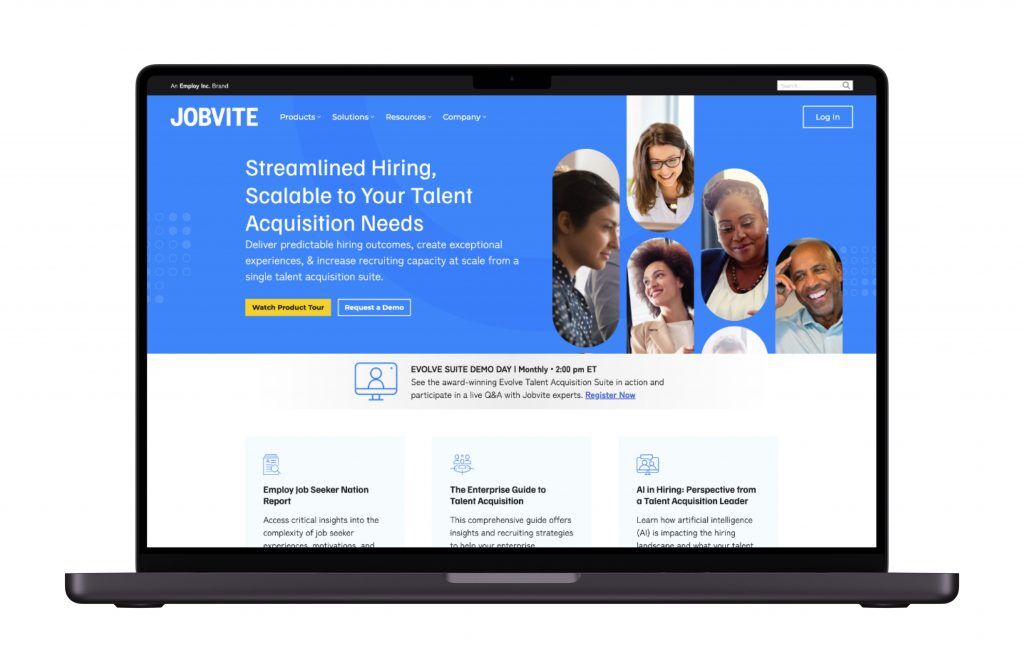
5 Steps to Choosing the Best HR Software Solution
Finding the best human resources software for your organization can be a daunting task.
With so many options available, it’s essential to follow a structured process to ensure you select the right solution.
Here’s an easy 5-step process to guide you through finding the best HR software for your needs.
1. Know Your HR Requirements
Before you start the software selection process, know your HR requirements.
To do that, assess your current HR processes and identify what needs to be improved or automated. Think about payroll, recruitment, performance management, employee self service, compliance and benefits administration.
Once you know your requirements you will be able to define what features and functionality your HR software must have.
2. Research HR Vendors
Once you know your HR requirements, the next step is to research HR software vendors.
Start by browsing through the top HR software solutions in the market we’ve mentioned in this article.
Look for vendors that cater to your industry and have features that match your requirements.
Along with this guide you can also use vendor websites, user reviews, industry reports and comparison guides to research.
This research phase is key to finding vendors that can meet your needs and budget.
3. Shortlist
Once you’ve researched, narrow down to a shortlist of the top HR software solutions.
Focus on vendors that have the features and functionality you defined in step one.
Think about ease of use, scalability, customer support and integration with your current systems.
4. Trial Your Shortlisted Vendors
With your shortlist in hand, it’s time to trial the selected HR software solutions.
Many vendors offer free trials or demos, providing an opportunity to test the software before making a commitment.
During the trial period, explore the user interface (UI) and user experience (UX) and evaluate its capabilities against your HR needs.
Involve key stakeholders and potential users in the trial to gather diverse feedback and ensure the software meets their requirements. Pay attention to any limitations or challenges you encounter during the trial.
5. Implement and Onboard
Now you’ve chosen the best HR software for your business, plan the implementation and onboarding.
Create a detailed plan with timeline, milestones and responsibilities. Get in touch with the vendor’s support team to ensure a seamless transition and use the resources they provide – training sessions, documentation and customer support.
Get your managers and employees involved early on so you can address their needs and they feel comfortable with the new software. This is key to getting the most out of the HR software and a successful rollout.
Use this to choose HR software with ease.
This will get you the right solution. Efficiency, compliance, insight and a better employee experience.
HR Software Costs and Pricing
The cost of HR software development can vary widely depending on several factors, such as the size of the business, the features and functionalities required, the deployment method (cloud-based or on-premises), and the vendor.
Here’s a rough idea of what you can expect:
Small Business
Basic HR software for small business might start at $5 to $15 per employee per month.
More advanced solutions with payroll, benefits administration and time tracking might be $15 to $30 per employee per month.
Medium-Sized Business
For medium-sized business, HR software costs are usually $20 to $50 per employee per month.
Solutions with advanced features like performance management, recruiting and analytics will be at the higher end of this range or more.
Large Business
Enterprise HR software often has custom pricing based on the business needs and size.
Costs can be $50 to $100+ per employee per month for full suites with global HR management, many integrations and advanced analytics.
One-Time Fees
Some vendors may charge one-time setup or implementation fees which can vary greatly depending on the complexity and scope of the deployment. These fees can be $100 to $1000’s.
Many HR software vendors offer tiered pricing plans based on number of employees and features.
Ask for quotes from multiple vendors, try free trials or demos and read reviews to understand the value and total cost of ownership before you decide.
Hidden Cost to Be Aware of
When buying HR software you need to look beyond the initial cost.
Many hidden costs can add up and blow your budget and make the software more expensive than you thought.
Here are the key hidden costs to consider:
Data Migration Fees
Data migration is the process of moving your existing employee data from your current system to the new HR software.
This can be a complex and time consuming process. Especially if your data is in multiple formats or systems. Many vendors charge extra for data migration services.
These costs will vary depending on the amount of data, complexity of the migration and level of support required. You need to know these costs upfront and factor them in your budget.
Extra Charges for Customer Support
While some HR software vendors include basic customer support in their pricing, others will charge extra for premium support services.
This can include 24/7 support, dedicated account managers or faster response times. Depending on the level of support your organisation requires, these extra charges can add up big time.
You need to know what level of support is included in the base price and what extra support options are available and their costs.
Training Costs
Implementing new HR software requires training your team to use the new system.
Some vendors offer free training resources, others will charge for training sessions, webinars or on-site training.
Training costs will vary depending on the number of users, complexity of the software and the training method.
Make sure your team is properly trained to get the most out of the new software so factor in these costs.
Fees for Updates or Upgrades
HR software like any other software needs updates and upgrades to stay current with new features, security patches and regulatory changes.
Some vendors include these updates in their subscription fees, others will charge extra for major upgrades or new features.
These fees can add up over time if the vendor releases new versions or significant updates frequently.
Learn about the most impactful cybersecurity trends to safeguard sensitive data and prevent breaches.
Custom Integration Costs
If your HR software needs to integrate with other systems, such as ERP, CRM or payroll systems, custom integration may be required.
Explore how CRM in recruiting can transform your hiring process and improve candidate relationships.
Custom integrations can be complex and costly, requires specialized development work. These costs will vary depending on the complexity of the integration, number of systems involved and level of customization required.
Talk to the vendor upfront and understand the costs to avoid hidden costs.
Hidden Costs of Downtime and Transition
The transition period from your old HR system to the new one can also incur hidden costs.
Your team may experience downtime or reduced productivity as they get used to the new system.
And there may be costs to maintain the old system alongside the new one during the transition period.
Plan for a smooth transition and allocate resources to manage downtime and mitigate these costs.
Licensing and Subscription Fees
While the initial purchase price or subscription fee is clear, there can be extra licensing costs for add-on modules or increased usage.
For example as your organisation grows you may need to buy extra licenses or upgrade your subscription plan.
Consider these costs when evaluating the long-term affordability of the software. 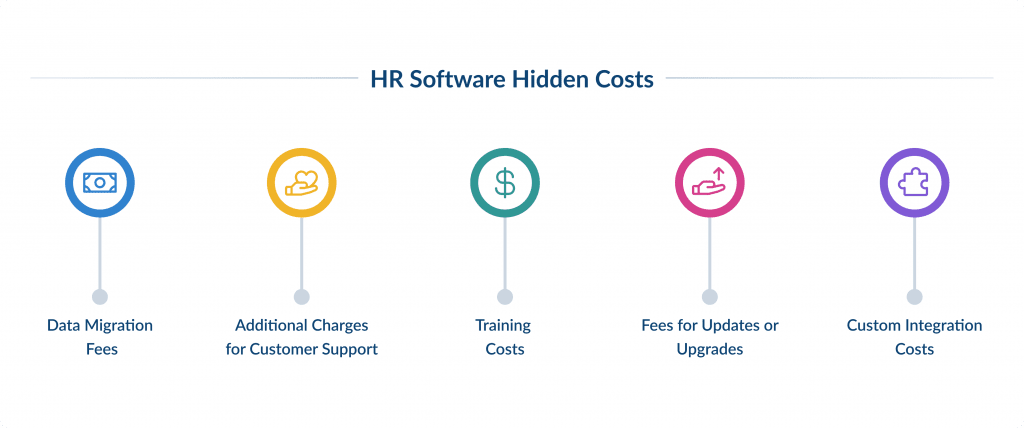
HR Software Trends and Predictions
HR software technology is growing and evolving every year. Here are some prominent trends and predictions that will shape HR software in the next few years.
We have gathered the insights from Delloitte 2025 HR technology trend predictions, Forrester HR Technology Survey, Gartner’s AI in HR research, and a few other reputable sources.
Let’s see what the future holds for HR software.
Generative AI Keeps Speading Into the HR Field
HR technology, a longtime user of AI and machine learning functionality, was quick to integrate generative AI capabilities into existing solution sets, allowing for targeted purposes—such as text-based content generation (for example, candidate interaction e-mails), large volume data summarization (for example, synthesizing feedback on performance), and insights surfacing (for example, querying HR policy to answer worker questions).
We expect that in 2025, Generative AI will be even further integrated with existing HR technology solutions sets and have the ability to exchange information directly with point solutions.
AI can be a complex field, but understanding the basics is easier with our comprehensive AI glossary.
TWI Growth
TWI combines different types of data, job postings, resumes, talent profiles and census data to give a complete view of the skills and talent in the market. This helps companies make better decisions around hiring, training and workforce planning leading to increased productivity and flexibility.
As companies adapt to new workforce trends there is a noticeable shift towards non-full time work arrangements. 55% of workers are open to flexible work arrangements and the use of contingent workers (temporary or part-time) is growing. In the US contingent workers now make up over a third of the workforce.
Get in touch today!
In 2025, HR teams will be focusing on managing these contingent workers better and ensuring they are fully integrated with full time employees. New regulations such as the EU’s Corporate Sustainability Reporting Directive will require transparent reporting on workforce composition. This holistic approach with TWI will help companies plan and navigate the changing job market better.
Headless HR Systems
Headless HR systems separate the back end functionality from the front end. This means more flexibility and customisation.
These systems can integrate multiple HR tools through application programming interfaces (APIs) to give a seamless user experience across different platforms.
This meets the needs of modern workforces by giving access to HR services on preferred devices and interfaces, and overall efficiency and user satisfaction.
Deskless Workers
There is a growing focus on HR solutions for deskless workers, retail, healthcare and manufacturing.
Mobile platforms are being built for these workers to access work information and collaboration tools anywhere.
Deskless workers.
Rise of EX Investments
In 2025, some will cut EX (employee experience) to save money but experts warn this will backfire.
J.P. Gownder from Forrester says many companies will invest in HR tech to improve efficiency not EX outcomes.
A strong EX program means higher productivity, lower turnover and more creativity. Savvy HR leaders will find ways to keep employees engaged even on tighter budgets.
AI in platforms like Microsoft Office and Salesforce is making EX more personal. Strategic tech investments will improve efficiency and personalization, cost less.
In the end companies that continue to invest in EX will be better placed to attract and retain top talent when the market shifts back to favour job seekers.
Diversity, Equity, and Inclusion in Workplace Culture
DEI is a big focus in modern HR.
HR software is adding features to track and improve DEI metrics such as diversity hiring practices, pay equity analysis and inclusive culture initiatives.
These tools create a diverse and inclusive workplace which is key to innovation and competitive advantage. 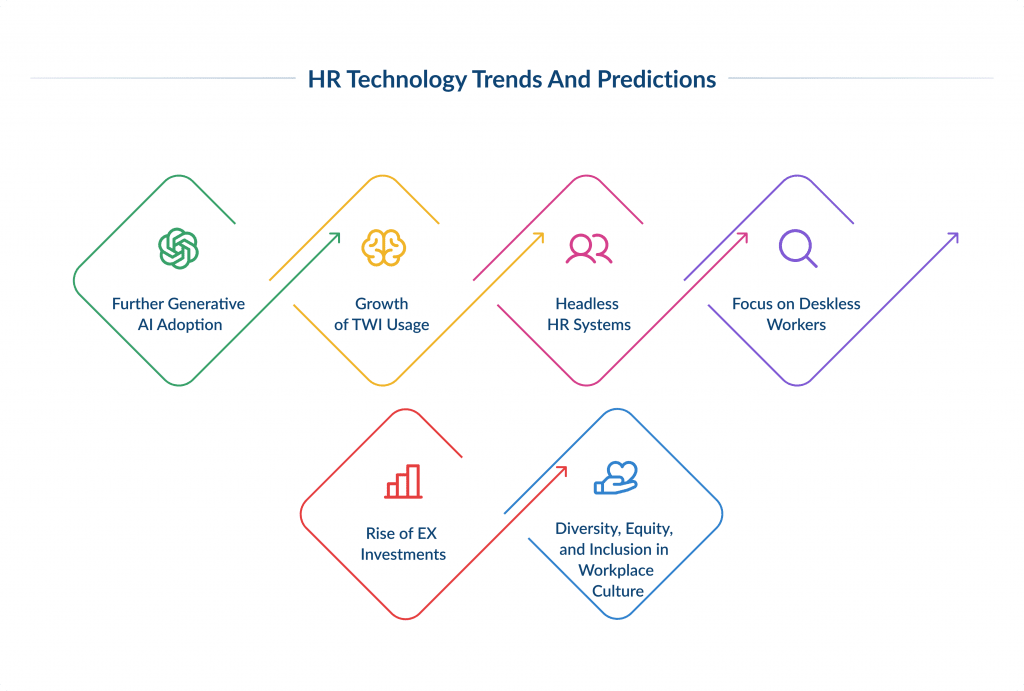
Thinking of Developing Your Own HR Software?
We are here to help you out! At SpdLoad, our core domain solutions are based on HR & Recruiting, custom Healthcare software development, and Enterprise Mobile App Development Solutions.
Developing custom HR software allows you to tailor features specifically to your business needs, ensuring a perfect fit for your unique processes.
At SpdLoad, we specialize in creating HR systems that streamline your operations and provide a seamless user experience. We emphasize the discovery phase to thoroughly understand your requirements, ensuring the final product meets your expectations.
For instance, we recently partnered with a mid-sized company to develop a custom HR system.
The project began with an in-depth discovery phase, where we identified the company’s specific pain points and needs. We then designed an intuitive interface that simplified user interactions and incorporated Lean methodologies to ensure efficient and cost-effective development.
Throughout the project, our transparent processes, open communication, and team engagement were key factors in delivering a successful solution.
So, if you’re considering developing your own HR software, partnering with us can help you create a solution that not only meets but exceeds your business needs.
Let’s get in touch to discuss your HR needs further.
Also, feel free to discover some of the best SaaS startup ideas that are driving innovation in the tech industry.





